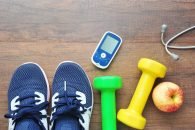Discover the 3 simple lifestyle changes that can actually reverse Type 2 diabetes
If you have been diagnosed with Type 2 diabetes or prediabetes, there is one question that has certainly crossed your mind: is it possible to reverse Type 2 diabetes? Type 2 diabetes has traditionally been considered a progressive, incurable condition that was difficult or even impossible to reverse. But there is good news – researchers have found that with certain intensive lifestyle changes, it is possible to reverse Type 2 diabetes, or at least send the symptoms into remission. According to a study published by the Centers for Disease Control and Prevention, individuals with Type 2 diabetes who lose a significant amount of weight and commit to a healthier lifestyle may be able to achieve a partial or total remission of diabetes symptoms.
The Look AHEAD (Action for Health for Diabetes) study followed more than 4500 overweight patients who had Type 2 diabetes for four years. Participants adopted a program of healthy eating, weight loss, exercise, and counseling sessions to manage their diabetes. At the end of a year, 11.5 percent of participants were able to at least partially reverse their diabetes. These individuals saw their blood sugar levels decrease to prediabetic status and were able to manage their symptoms without taking insulin. Researchers found that participants who maintained their commitment to their new lifestyle found the most success in reversing Type 2 diabetes.
How to reverse Type 2 diabetes
In order to reverse Type 2 diabetes, individuals need to commit to making certain changes in their daily habits. People who have been diagnosed with prediabetes will yield even greater benefits from these lifestyle changes, as making the switch to healthier habits now may actually prevent Type 2 diabetes from ever developing in these individuals. If you are interested in trying to reverse type 2 diabetes and reduce or eliminate your need for insulin, the study suggests that you should make the following lifestyle changes:
Lose weight
When individuals with Type 2 diabetes carry extra weight, particularly in the abdomen or belly, it impairs their body’s ability to respond to insulin. Even minor weight loss can improve your blood glucose levels and reduce your body’s need for insulin. Losing any amount of weight will help, but the study found that participants that lost significant amounts of weight had the most success at returning to prediabetic glucose levels. Losing weight also reduces the risk of other health risks associated with diabetes, including heart disease and stroke.
Follow a Type 2 diabetes diet
Switching to a Type 2 diabetes diet will help decrease your need for insulin and support your efforts to lose weight. Some of the key attributes of diabetes-friendly diets include choosing low carb options filled with whole grains; eating lean meats, and substituting healthy fats for saturated fats. Eliminate sugary foods, sodas, and fruit drinks that can cause glycemic levels to spike and reach for fruits instead. Adopting a Type 2 diabetes diet and choosing smaller portion sizes will improve your overall health while helping to coax your diabetes into remission.
Exercise regularly
Increasing your physical activity level to a goal of 175 minutes per week will help you reverse the effects of Type 2 diabetes. Achieving this is easier than it might seem, as adding just 35 minutes of exercise 5 days a week will allow you to reach that goal. Embarking on a regular program of exercise offers several benefits that will help you gain better control of your diabetes. When you exercise, the muscle contractions help your body utilize glucose efficiently, while the aerobic benefits of physical activities help you burn calories and lose weight.
Now that you know it is possible to reverse Type 2 diabetes by eating a diabetes friendly diet, losing weight, and exercising, it may be easier for you to make these healthy lifestyle changes. www.BetterHealthKare.com can help, with weight loss tips for diabetics, easy diabetes-friendly recipes, exercise tips for diabetes, and more to help you enjoy a healthier future.



